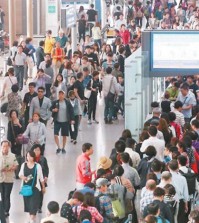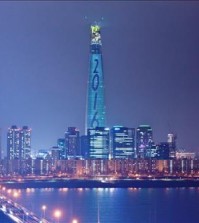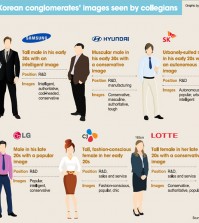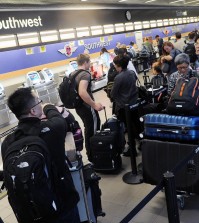- California Assembly OKs highest minimum wage in nation
- S. Korea unveils first graphic cigarette warnings
- US joins with South Korea, Japan in bid to deter North Korea
- LPGA golfer Chun In-gee finally back in action
- S. Korea won’t be top seed in final World Cup qualification round
- US men’s soccer misses 2nd straight Olympics
- US back on track in qualifying with 4-0 win over Guatemala
- High-intensity workout injuries spawn cottage industry
- CDC expands range of Zika mosquitoes into parts of Northeast
- Who knew? ‘The Walking Dead’ is helping families connect
Lotte skyscraper faces image problem over family feud
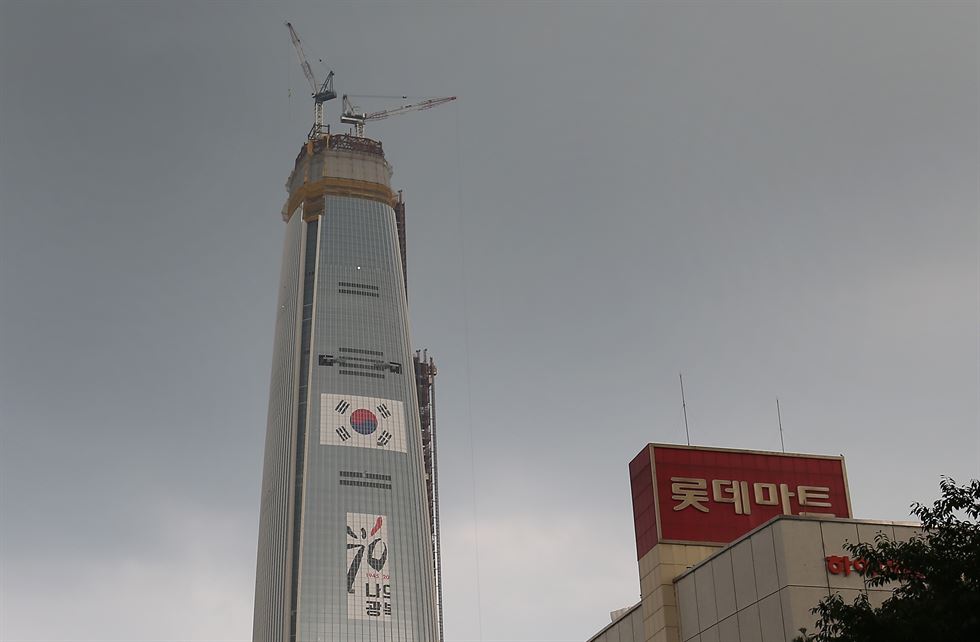
South Korea’s national flag is hung on the Lotte World Tower under construction in Seoul in this file photo taken on Aug. 7, 2015 (Yonhap)
SEOUL, Aug. 31 (Yonhap) — When South Korea marked its 70th anniversary of independence from Japan’s colonial rule on Aug. 15, Lotte Group, a retail conglomerate based both in Seoul and Tokyo, hung up a huge Korean national flag on the 123-story skyscraper under construction in southeastern Seoul.
Although Lotte was not the only conglomerate to cover its building with a giant flag, the Lotte World Tower’s move drew more public attention than any others.
It was not because the flag was hung up at the capital’s new landmark, but because most people deemed the event as a mere publicity stunt designed to help mitigate concerns over its safety and public criticism of the group following a bitter family feud over control of the sprawling business empire.
Although it was partially opened in October, the skyscraper, the Lotte founder’s long-coveted dream, faces the tough task of reassuring shoppers who remain jittery over its structural soundness.
The construction of the skyscraper, which will emerge as the tallest building in South Korea when completed in 2016, has gone through various challenges since it was first envisioned in the 1980s.
A series of cracks and subsidence were discovered on roads near Lotte World Tower late last year, after the skyscraper’s lower floors opened amid public skepticism over the state of its foundation.
Wrapping up a week-long inspection, experts concluded that those cracks and subsidence were not dangerous, but the discovery frightened nearby residents and sparked a safety scare among shoppers. The building was also blamed for the drop in the water level of a man-made lake in the area.
Despite Lotte’s efforts to prove the safety of the building and its plan to relocate the group’s main office to the tower, the photos of cracks and holes went viral on the Internet, aggravating public distrust.
Making matters worse, some of the facilities were shut down in December, pending an investigation into water seepage at its aquarium and vibrations at the movie theater.
Growing uneasiness over the safety of the skyscraper caused shoppers and tourists to avoid it, hitting owners of shops in the building hard.
Another blow was the outbreak of the Middle East Respiratory Syndrome (MERS) in May this year, which has claimed 36 lives and prompted people to shun crowded places.
Nevertheless, the tower kept rising higher and is slated to be completed next year as scheduled, Lotte said, stressing the number of visitors to the mall has recovered to the level before the MERS outbreak.
Industry watchers say the safety of Lotte World Tower can be improved through repair work and other measures, but it faces a more fundamental problem: the dissipation of public sentiment against Lotte Group sparked by the family struggle over the nation’s fifth-largest conglomerate, whose businesses range from food and retail to construction and chemicals.
The sometimes nasty family power struggle has laid bare the murky governance structure of Lotte Group, reignited sentiment against family-controlled conglomerates, known as chaebol here, and prompted an all-out government probe into the group.
Founded by Shin Kyuk-ho in 1948 in Japan as a confectionery firm, Lotte tapped the South Korean market in the 1960s. Its unique background allowed Lotte to operate in Seoul, free from the antagonistic sentiment over Japanese capital here.
Japan ruled the Korean Peninsula as a colony from 1910-1945, with numerous women being coerced into sexual servitude at front-line brothels for Japanese soldiers during World War II.
Japan has not apologized over the matter yet, which makes relationships with Tokyo a sensitive issue in every aspect of Korean society, including the business community.
But public sentiment of Lotte Group turned further sour in the wake of the management struggle between the two sons of the 93-year-old founder.
The younger son, Dong-bin, has been engaged in a bitter battle with his brother, Dong-joo, as well as the founder, who claimed that the elder sibling should succeed as the new head of the conglomerate.
The family war has made many South Koreans frown. More importantly, however, the feud has revealed the group’s complex governance structure based on a cobweb of cross-shareholdings, where Seoul-based Lotte Group is controlled by Tokyo-based Lotte Holdings.
“When we look into the management structure of Lotte, Japanese arms dominate affiliates in South Korea,” said Jeong Sun-sup, who heads Chaebul.com, a local researcher that tracks family-run business groups.
“Although it is aggressive to say that Japan is taking wealth out of South Korea, they take dividends, and the cash earned in Seoul does not stay here,” Jeong added. “For Lotte, all businesses in South Korea are only overseas arms.”
With the public being more aware of Lotte’s Japan-oriented business structure, industry watchers said South Koreans may continue to harbor ill will against the skyscraper, even if all the safety issues are solved.
When Dong-joo held interviews with South Korean media amid the rising dispute, he spoke only in Japanese, adding to the public’s negative sentiment against Lotte. Dong-bin was able to speak in Korean, but his strong Japanese accent also made the impression that the nature of Lotte is based in Japan.
South Korean shoppers say they will avoid shopping at the Lotte World Tower because of their negative impression of the conglomerate.
“I will not go shopping at the Lotte World Mall because I was disappointed in the family power struggle,” said Park Jy-in, a 27-year-old who passes through the skyscraper every day to work. “The Japanese-Korean firm does not take much social responsibility here.”
Experts say Lotte Group should ease the tangled connection between its Japanese and South Korean affiliates if it wants to regain trust here as the major maker of beloved snacks,
“Lotte must invest more and spend what it earned in South Korea here,” Jeong added. “I do not think South Koreans oppose the system where a foreign firm rules local companies. It is because they are Japanese.”







